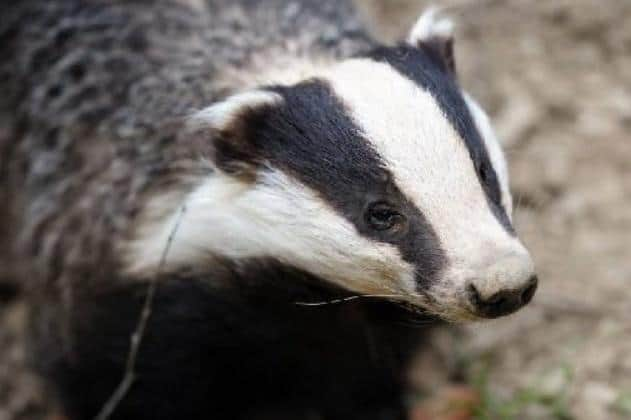Wildlife groups’ court hearing challenge to Northern Ireland badger cull by shooting
and live on Freeview channel 276
Wild Justice and Northern Ireland Badger Group (NIBG) claim a decision announced in March 2022 by Agriculture Minister Edwin Poots, to allow farmers to use rifles to kill up to 4,000 badgers a year, is “unlawful”.
Wild Justice and NIBG, supported by the Born Free Foundation, argue that the consultation by DAERA, on options to control the badger population to tackle bovine tuberculosis (bTB), “did not meet the requirements for a lawful consultation”. Therefore, the resulting decision to choose to control the badger population with rifles was “also unlawful”.
Advertisement
Advertisement
The campaigners will also argue that Mr Poots’ decision is unlawful, because he issued the Article 13 (power to destroy wildlife) order under the Diseases of Animals 1981 Order, without making sure that there is “no reasonably practicable alternative way of dealing with bTB in Northern Ireland”.


The consultation proposed a badger cull as the preferred option for addressing bTB based on a ‘business case’, which was not disclosed as part of the consultation documents. This meant that the consultation was “not procedurally fair, because consultees could not make a properly informed response to the proposal for a cull without seeing the business case which underpinned it”.
The arguments will be made at a judicial review hearing to be held at the Royal Courts of Justice in Belfast on Friday morning.
Wild Justice and NIBG are represented by law firm Leigh Day and will argue that Mr Poots’ consultation on controlling the badger population in Northern Ireland gave them inadequate and insufficient information to allow them to engage with it properly and that he failed to consider the responses they were able to make.
Advertisement
Advertisement
The consultation, held in summer 2021, was the second of three initiated by DAERA. The first was held in 2017 and the third was in 2022. NIBG responded to all three. The paper set out DAERA’s long term aim to control bTB by vaccination, but stated that first the infection load in the badger population must be reduced by culling.
The several options to achieve that goal referred to “the business case underpinning the bTB eradication strategy” but it “lacked the necessary detail for a meaningful response”. Detail about the business case was also refused in response to a Freedom of Information request. Wild Justice and NIBG argue that, without information on assumptions made by the business case, it was impossible to properly respond to the consultation exercise.
DAERA singled out Option 8 – culling by shooting of roaming badgers by farmer-led companies – as its preferred option and asked its consultees if they agreed. But without the business case, Wild Justice and NIBG say it could not understand or properly respond to Option 8.
They argue that the humaneness of the options available does not appear to have been factored into considerations. They also say the possibility that informed consultation responses could have affected the outcome is clear because when the options were scored, the most humane option (a selective cull via test, vaccinate, remove (TVR)) scored only 10 per cent lower than the least humane option chosen.
Advertisement
Advertisement
Wild Justice said: “We’re on the side of badgers, and we also expect governments to stick by the rules. DAERA cut corners in their consultation and that disadvantaged those who responded to make the case for badgers. This cull should not go ahead.”
Mike Rendle of NIBG said: “Consultees were not given sufficient information to allow them to make an informed decision about the proposed badger intervention. The consultation was clearly not fit for purpose, yet the minister chose to carry on regardless. The minister went on to announce the cruellest possible badger intervention open to him, despite the large consensus of expert opinion that badger culling is inhumane and ineffective.”
Dr Mark Jones of the Born Free Foundation added: “DAERA’s refusal to disclose the full details of its Business Case during the consultation process on its policy made it impossible for consultees to scrutinise the financial and other arguments it had in mind in proposing to introduce badger culling. The introduction of an England-style badger cull, when the latest peer-reviewed science from England clearly demonstrates the failure of this approach to reduce bovine TB in cattle, should be immediately withdrawn. Born Free has long opposed the culling of badgers as a means of controlling bovine TB in cattle on the basis that it is unscientific, inhumane, ineffective, and unnecessary.”
Wild Justice and NIBG are represented by Carol Day and Ricardo Gama at Leigh Day, with Phoenix Law as agents in Northern Ireland.
Advertisement
Advertisement
Leigh Day environmental law specialist, solicitor Ricardo Gama, stated: “The Northern Ireland executive failed to provide consultees with the information that they needed to have any hope of providing informed responses to their suggestion of a badger cull. They have also failed to show that there aren’t other reasonably practicable alternatives to culling, which is what is needed in order for the executive to allow, and even encourage, the killing of this protected species.”